Agriculture & Environment
Prof. Elly N. Sabiiti Delivers Valedictory Lecture to CAES Community, Recounts His 43-year Experience at Mak
Published
3 years agoon
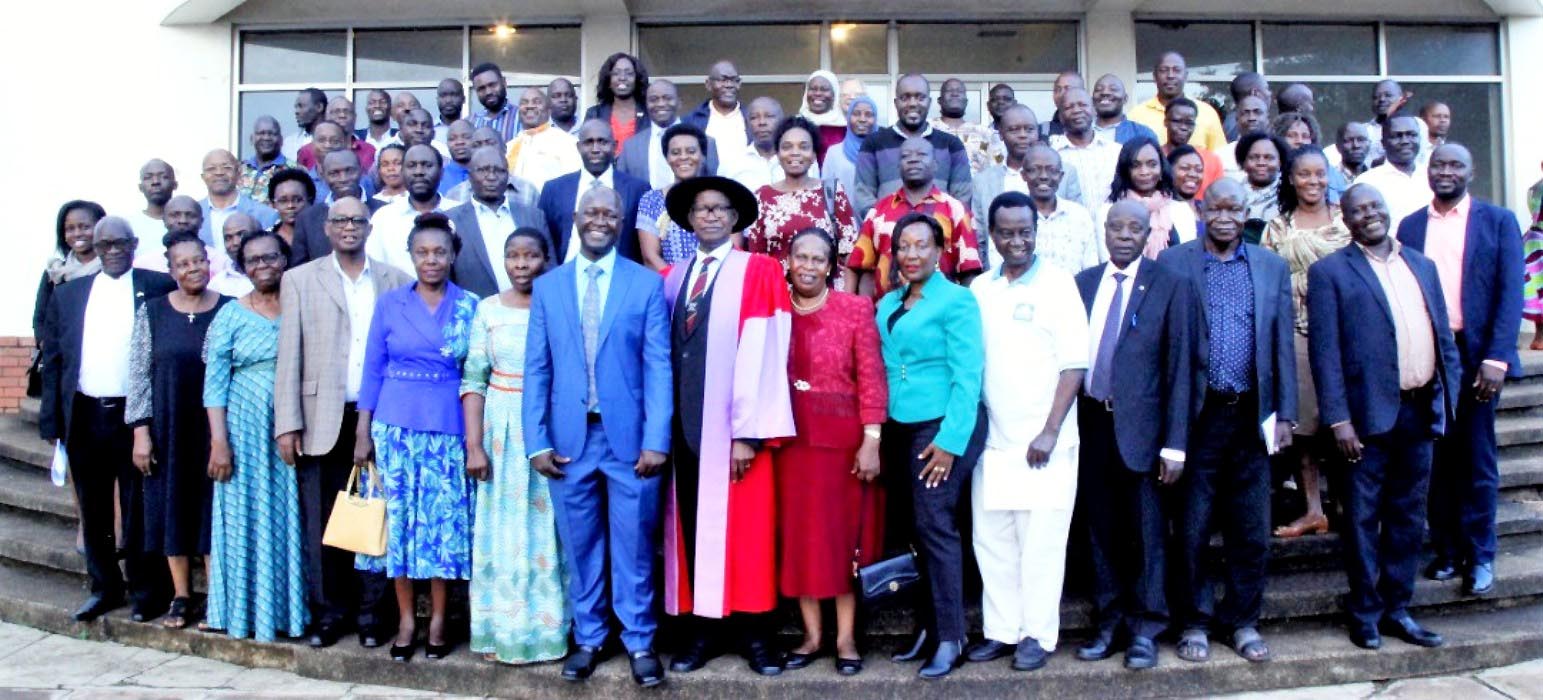
Theme of the Lecture: “My Inspirational Academic Track Service at Makerere University: A Case for CAES”
After 43 years of dedicated service to Makerere University, Prof. Elly N. Sabiiti, a prolific researcher and internationally recognized scholar, currently working at Busitema University–Faculty of Natural Resources and Environmental Sciences, retired from university service in 2021. On 2nd September 2022, Prof. Sabiiti, in company of his wife Joy Sabiiti delivered a valedictory lecture to staff at the College of Agricultural and Environmental Sciences (CAES), Makerere University. The lecture organized by the Office of the Principal, CAES and held in the Conference Hall at the School of Food Technology, Nutrition and Bio-engineering focused on his experiences, achievements, challenges, and strategies that enabled CAES to evolve from a Faculty to one of the most celebrated Colleges at the University. He specifically spoke about his career development in terms of teaching, research, graduate supervision, leadership, resource mobilization, representation on professional bodies, and outreach services, before sharing his thoughts for CAES to grow to higher levels and excel in Agricultural and environmental Sciences.
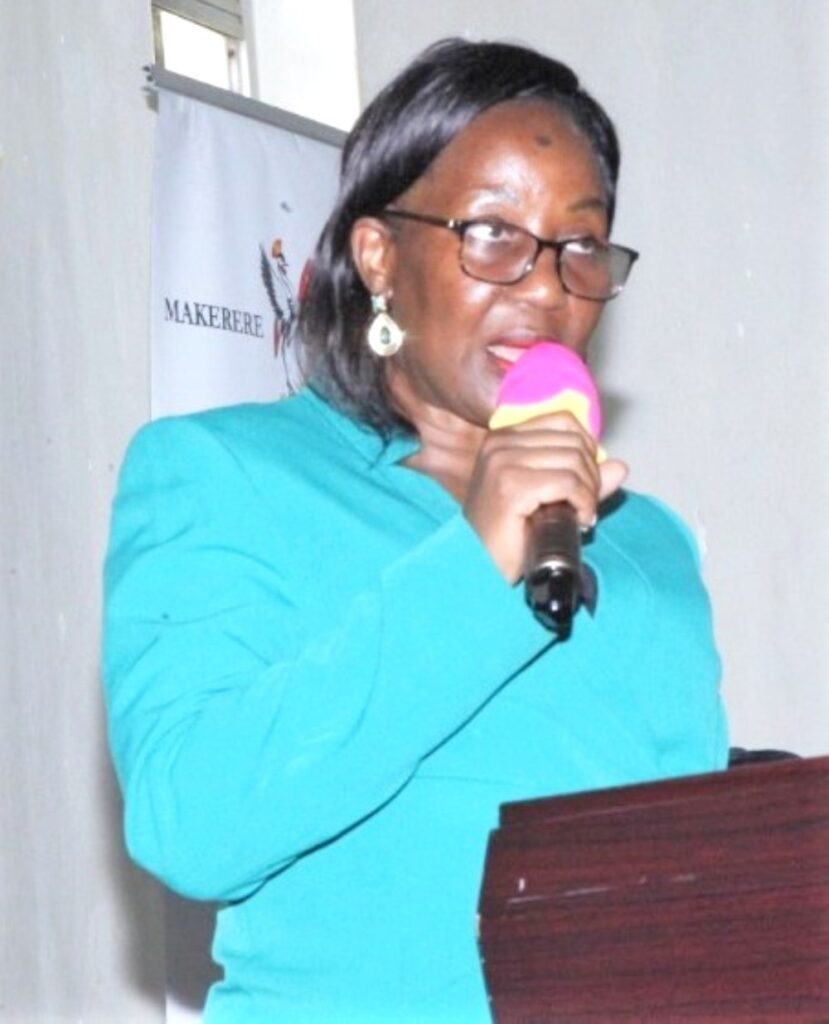
Addressing members of staff, Prof. Sabiiti noted that he was happy to be delivering his Valedictory Lecture at the time Makerere University is celebrating 100 years of existence and excellence. He appreciated Makerere University Management for providing a conducive environment and facilities that enabled him to excel to become an international professor. He equally appreciated all development partners who supported his academic journey. Having joined Makerere University in 1973 as an undergraduate student, Prof. Sabiiti rose through the ranks to become a professor in 1998. During his time at Makerere, Prof. Sabiiti served in various capacities and made enormous contribution towards the development of the College of Agricultural and Environmental Sciences (CAES) and Makerere in general. At the time of his retirement, he was serving as a Professor in the Department of Agricultural Production at CAES.
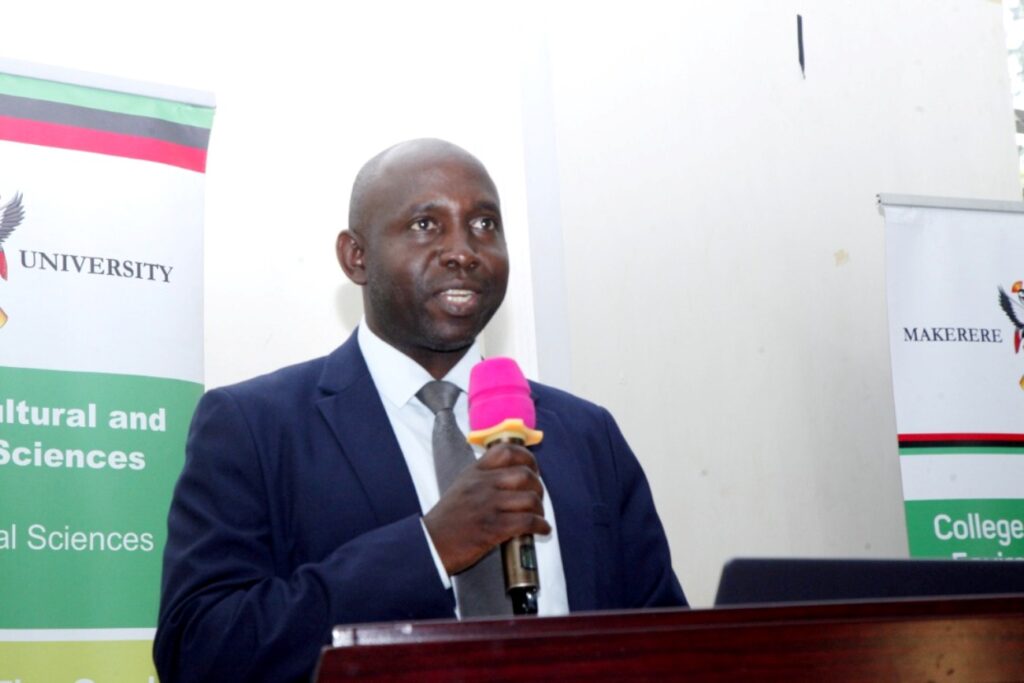
Academic contributions
At Makerere, Prof. Sabiiti had an illustrious career. He developed and taught several undergraduate and graduate courses namely; Undergraduate – Pasture Agronomy, Plant Genetic Resources and Utilization (developed), Seed Science and Technology (developed), Forest Fire Ecology, Agricultural Botany, Ecology and Crop Practical Skills. Graduate courses developed and taught by Prof. Sabiiti included Agronomy of Grasslands, Eco-physiology (developed), Seed Science and Technology (developed), and Plant Genetic Resources and Utilization. He played a key role in the transformation of the Agricultural Husbandry Forum to a Regional Forum based at Makerere University. He established collaboration at local and global levels with various institutions such as Swedish University of Agricultural Sciences, ILCA, AFRINET, ICRAF, NARO, ASARECA and this improved visibility of the Faculty of Agriculture and Forestry. Prof. Sabiiti supervised 33 graduate students, 26 MSc and 7 PhDs and had over 150 publications by the time he retired. He supervised and supported several members of staff to attain doctorates and to raise through the ranks to become senior lecturers and associate professors. These include, Dr Denis Mpairwe, an Assoc. Prof and former Head, Department of Agricultural Production; Dr Justine Kasozi Nambi, Senior Lecturer in the Department of Agricultural Production; Dr C Katongole, Senior Lecturer in the Department of Agricultural Production, and Coordinator Centre for Waste Management; Dr Sylvester Katuromunda, Senior Lecturer in the Department of Agricultural Production; Dr Jeninah Karungi-Tumutegyereize, an Assoc. Prof. in the Department of Agricultural Production; Dr A. Amoding, Department of Agricultural Production; Dr W Ekere, Department of Agricultural Production (Retired); Dr. A. R. Turinawe, Department of Agribusiness and Natural Resource Economics; Dr O. Walekhwa, Department of Agribusiness and Natural Resource Economics (Deceased); Dr Okello, Senior Lecturer, CoVAB; Dr H. Kato, Associate Professor, Kyambogo University; and Dr S. Mugasi, ED, NAADS.
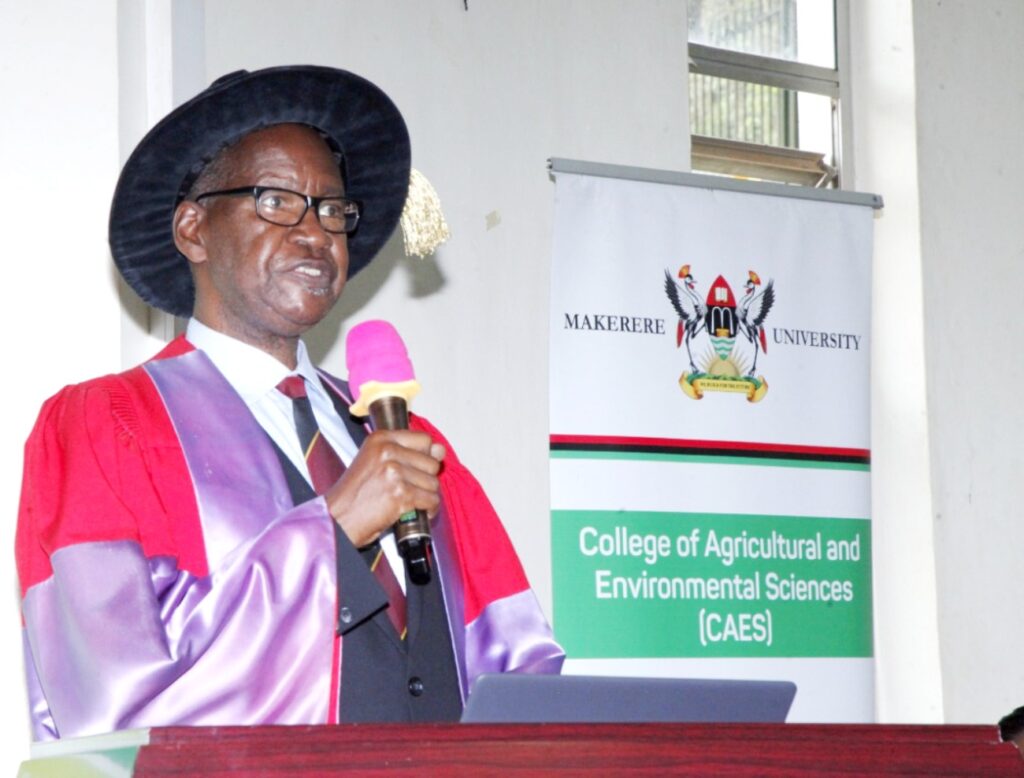
Curriculum Expansion
As Dean Faculty of Agriculture and Forestry, Prof. Sabiiti was instrumental in the review and expansion of academic programmes at CAES. “There used to be one MSc in Agriculture with options but these would not be reflected on the degree certificate so we revised the old curriculum and proposed specialized MSc degrees of the various options, MSc Crop Science, MSc Soil Sciences, MSc Animal Science, and MSc Agricultural extension and this increased post graduate numbers. I led the development of a highly popular program –Masters in Agribusiness Management that combined science courses with agricultural economics to produce agribusiness entrepreneurs and make agriculture a rewarding business. We also revised the undergraduate degree programme from three: Bsc Agriculture, BSc Food Science and Technology and BSc Agricultural Engineering to over 10 programs,” he noted. “By the time I handed over to the next Dean, Prof. Matete Bekunda in 2003, the Faculty was leading in Academic programmes, significant financial research funds, several publications, and staff with PhD as well as MSc.”
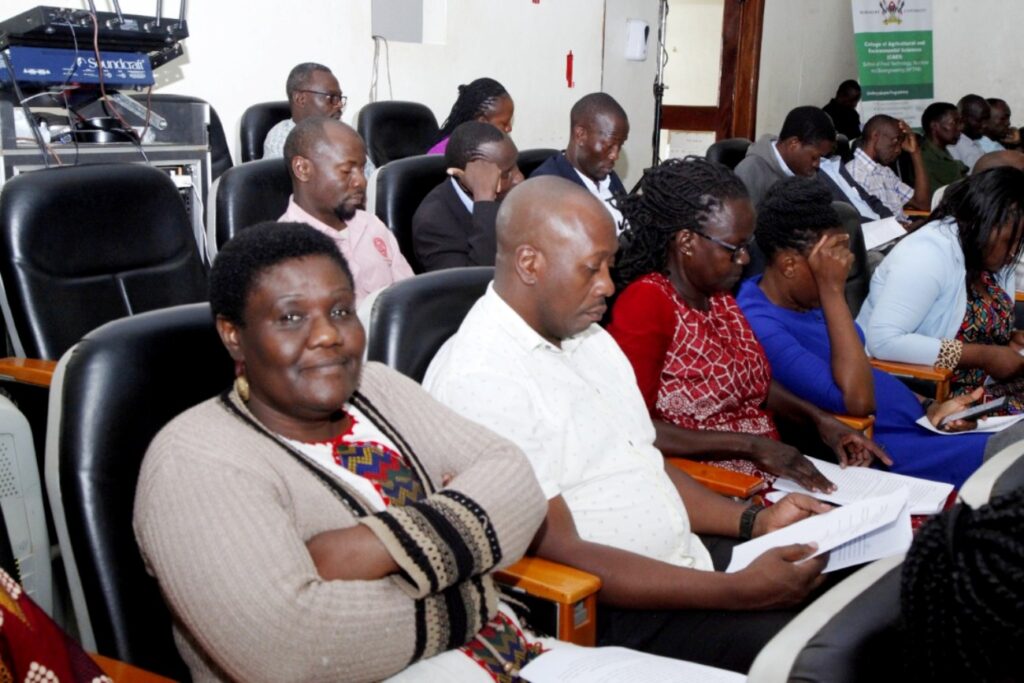
Administrative roles
Administratively, Prof. Sabiiti held several leadership positions spanning a period of nine years, 1993-2003. He served as Head, Department of Crop Sciences, and Dean – Faculty of Agriculture and Forestry (November 1994-2003). Recounting his experience, Prof. Sabiiti said it was during his period as Dean that the Faculty had unprecedented growth in terms of Infrastructural development – the evolution of two Faculties and a Research Institute, and academic programs (under /postgraduate programs). In 1998, the Faculty of Agriculture and Forestry split to two Faculties, Faculty of Agriculture and Faculty of Forestry and Nature Conservation. With NORAD support, a building/home was constructed to house the Faculty of Forestry and Nature Conservation. Kabanyolo University Farm also through a vigorous process was upgraded to Makerere University Agricultural Research Institute Kabanyoro (MUARIK). “With good collaboration with NARO, the Faculty benefited from World Bank funding for five years and the Continuing Agricultural Education Centre (CAEC) was constructed as well as a postgraduate building mainly for girls. Using some innovations, a football field was constructed at MUARIK. With this funding, several staff got further training for Masters and PhD and short courses thus building capacity,” he noted. With savings from overhead costs from research and donor-funded projects, the then faculty was able to purchase for the first time a Leyland bus which is still functional-over 24 years), a small Tata bus, a tractor, a car for the Deputy Dean and restored Fish ponds at MUARIK. The other major purchase was about 100acres of land at Namalyagonja bordering MUARIK land. This was to be used for income generation from crop production, especially growing maize. According to Prof. Sabiiti, the idea behind purchasing more land was to prepare for the future plan to have a College and eventually an Agricultural University.
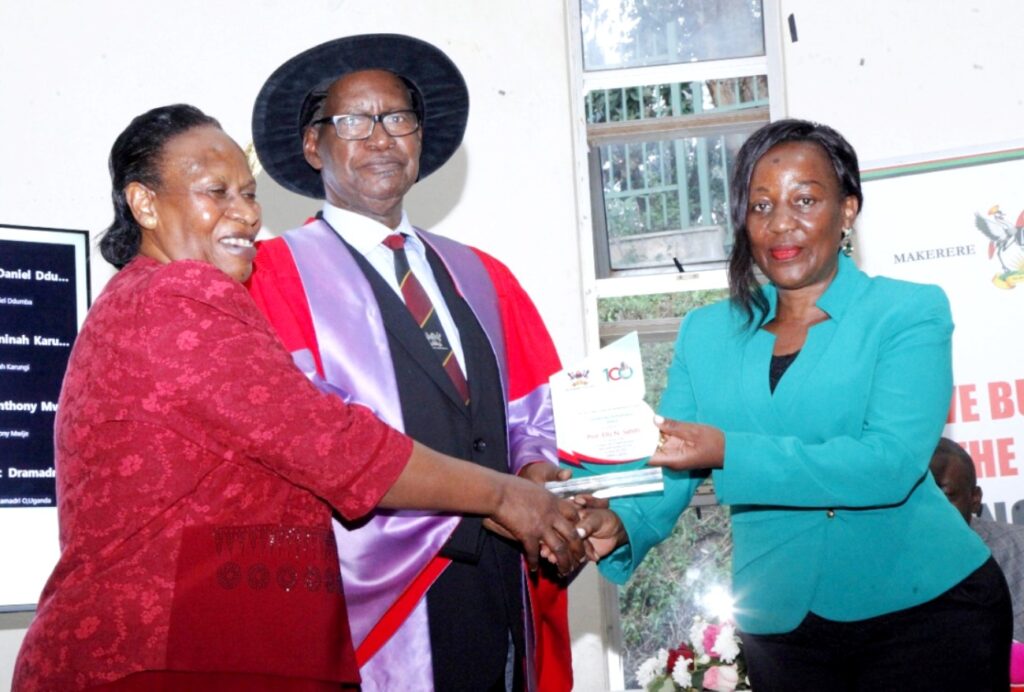
Other important contributions to the University
Prof. Sabiiti represented the Faculty of Agriculture in Senate. He also Coordinated the SIDA program he had initiated in 1999 to build PhD capacity for staff, improve lab equipment and enhance collaboration with Swedish Universities which was about 2m US$ for 15 years, and the Dryland husbandry Project based in Kazo, about US$850,000. He also served on Boards such NAADS, NEMA UNEB, UISTF /committees–I@Mak, where he had been appointed in his professional capacity. “The SIDA funding is one of my celebrated contributions to the College where we trained in joint collaboration with the Swedish University of Agriculture and produced 9 PhD staff, several MSc staff and also supplemented two staff to finish their PhDs (Drs Katuromunda and Obaa). ”While in Senate, Prof. Sabiiti participated in the formation of the Collegiate system at Makerere University. He also defended the approval for the establishment of the Agrostudies program between CAES and Israel Institute funded by the Israeli Government which has become very popular at Makerere and at other Ugandan Universities. He served as Chair for Professorial Inaugural Lectures for 14 years. He initiated collaboration between the University of Western Sydney, Australia and Makerere University 1995 todate where one PhD from CAES was sponsored by that University and she graduated this year in May 2022. He spearheaded the establishment of the first Makerere University Centre of Excellence in Waste Management at MUARIK which was commissioned by the Swedish Ambassador to Uganda in 2017. It has state-of-the-art equipment for bio-waste research. The Centre was also supported by Edmonton Centre of excellence in Waste management, Edmonton, Canada, Bank of Uganda, Makerere University top management and CAES.
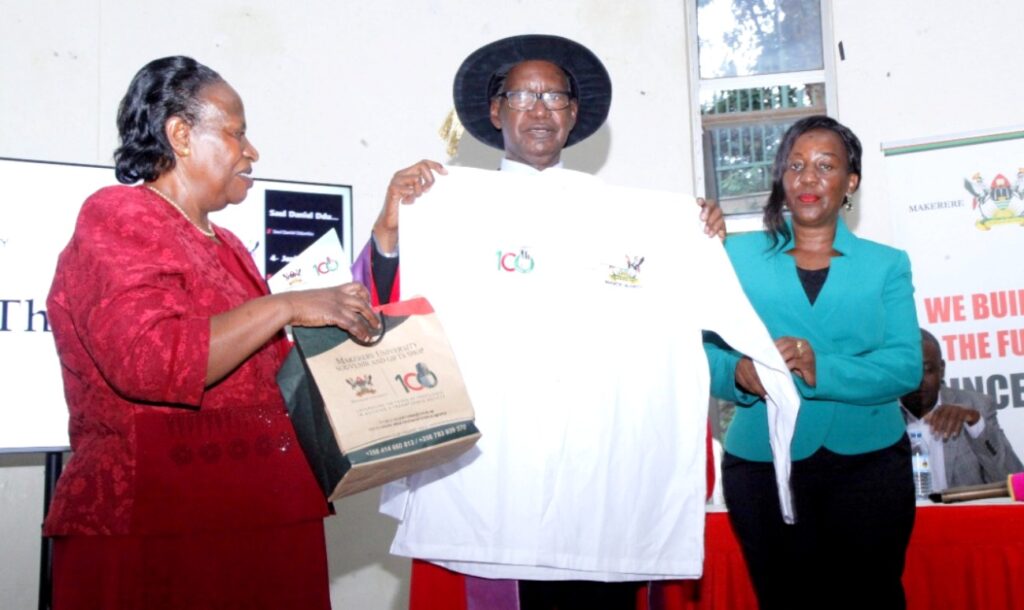
Recognition Awards based on performance as an Academician and administrator
While in service, Prof. Sabiiti received several awards, locally and internationally in recognition of his excellent performance. These include;
- Makerere University Appreciation Award by the Vice Chancellor Prof. Barnabas Nawangwe in recognition of his distinguished and dedicated service to Makerere University, specifically for the leadership and devotion as Chairperson for the Professorial Inaugural Lectures Organizing Committee 2007-2021.
- Was awarded the highest National award for Civilians as a Hero – Independence Golden Jubilee Medal by H.E. the President of the Republic of Uganda for his outstanding contribution in research, teaching, outreach, institutional building and administration and his loyalty to the Nation – 26th January 2017.
- Appointed by the Board of Directors of the Association for Strengthening Agricultural Research in Eastern and Central Africa (ASARECA) as the 1st President of ASARECA General Assembly, December 2011 because of his outstanding contributions in agricultural research and served for two years.
- Recognized by Makerere University in April 2015 for coordinating very successful research collaboration with SIDA financial support 2000-2015.
- Winner of the Presidential Excellence award for Science, technology Education Excellence 2008 for outstanding contribution in the understanding of ecological dynamics of rangeland /grasslands and institutional development.
- Winner of the Makerere University Vice Chancellor’s Innovations and Academic Excellence Award 2007/2008 for transforming the living conditions of Pastoral communities in Kazo rangelands.
- Received a Certificate of Recognition from Bishop Stuart University, Mbarara for his outstanding and dedicated services to the University as its pioneer Chairperson of Council 2003-2018.
- Received recognition (FELLOW) of the Uganda National Academy of Sciences (UNAS) for exemplary contribution to science and technology, 2004.
- Received Recognition Award from the Faculty of Agriculture, Makerere University for having contributed significantly to the establishment of the Continuing Agricultural Education Centre (CAEC) in 2001.
- Was awarded a golden plaque by the Faculty of Agriculture – Makerere University, in recognition of his outstanding leadership as Dean 1994 – 2003.
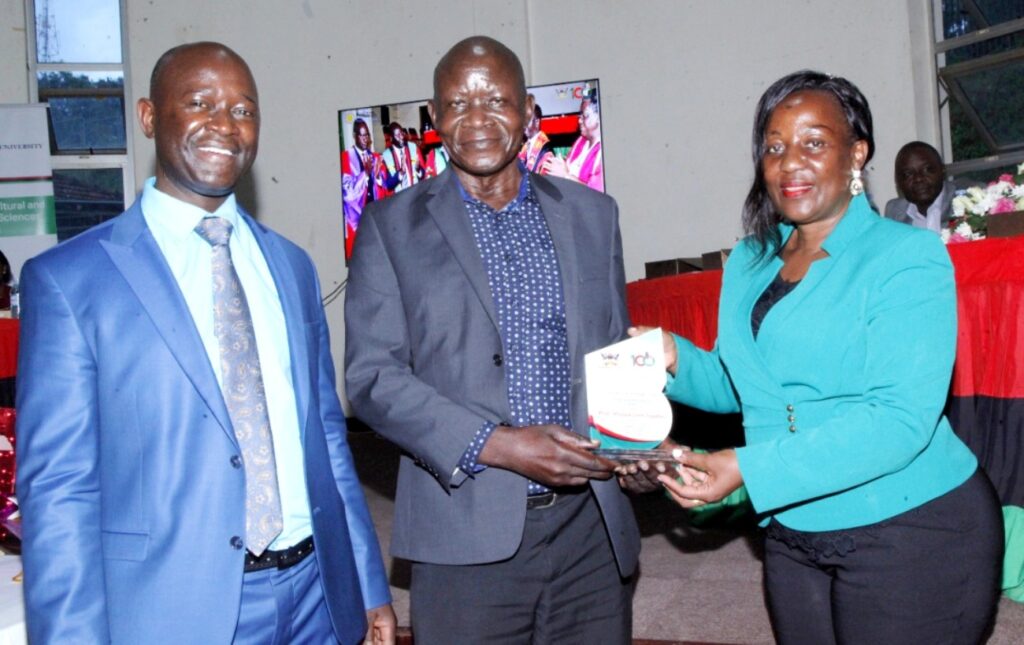
Regional Recognition
- Elected Vice President, African Academy of Sciences based in Nairobi 2019 todate.
- Recognized Fellow in 2007 of the African Academy of Sciences (AAS) based in Nairobi, Kenya for his outstanding scientific contribution in agronomy and Ecology.
- Received recognition award for Distinguished Service as Chairman of the National Steering Committee and National Coordinator of the Dryland Husbandry Project, Uganda from 1995-2003 from the Organization for Social Science Research in Eastern and Southern Africa (OSSREA), July 2004.
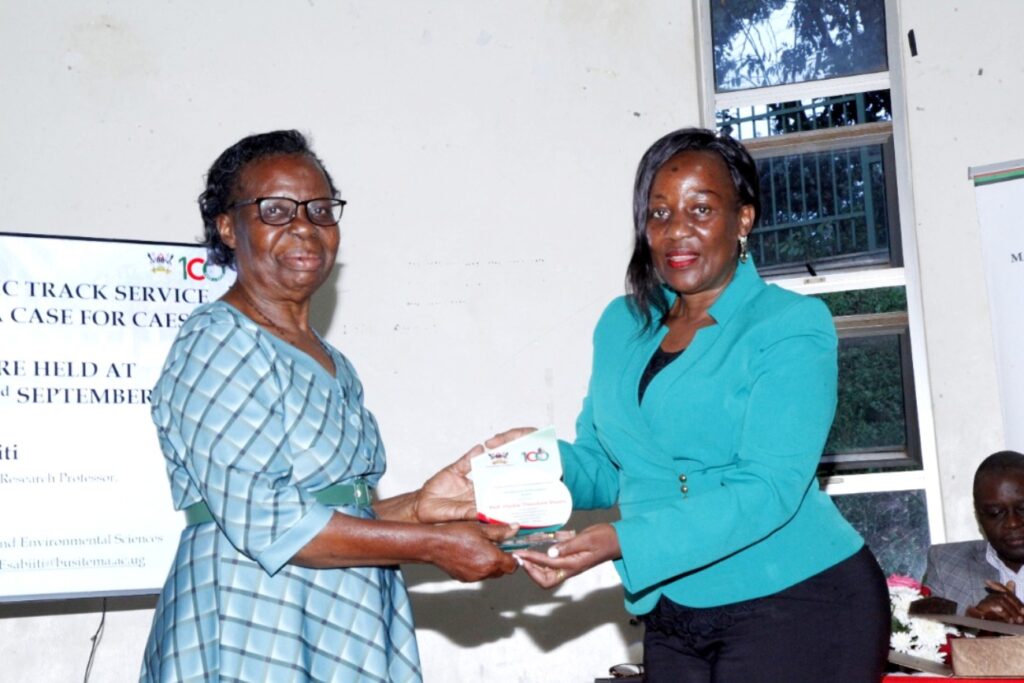
International Awards
- Won the prestigious Fulbright Fellowship for Senior African Scholars 2005/16 offered by USA Department of State and was implemented at the Ohio State University and became a Fulbright Scholar 2016 to-date.
- Elected a Fellow by the Governing Council of the Academy into The Third World Academy of Sciences (TWAS) 2001.
- Received recognition award for extraordinary service to the Inter Academy Council as a Member of the Panel on Science and Technology Strategies for Improving Agricultura Productivity and food Security in Africa from the Board of Inter Academy Council, The Netherlands, 27th August 2004.
- Appointed a TWAS Research Professor in Dec 2006 for five years by the Academy of Sciences for the developing World (TWAS) Secretariat based in Trieste, Italy and was hosted by the National University of Rwanda.
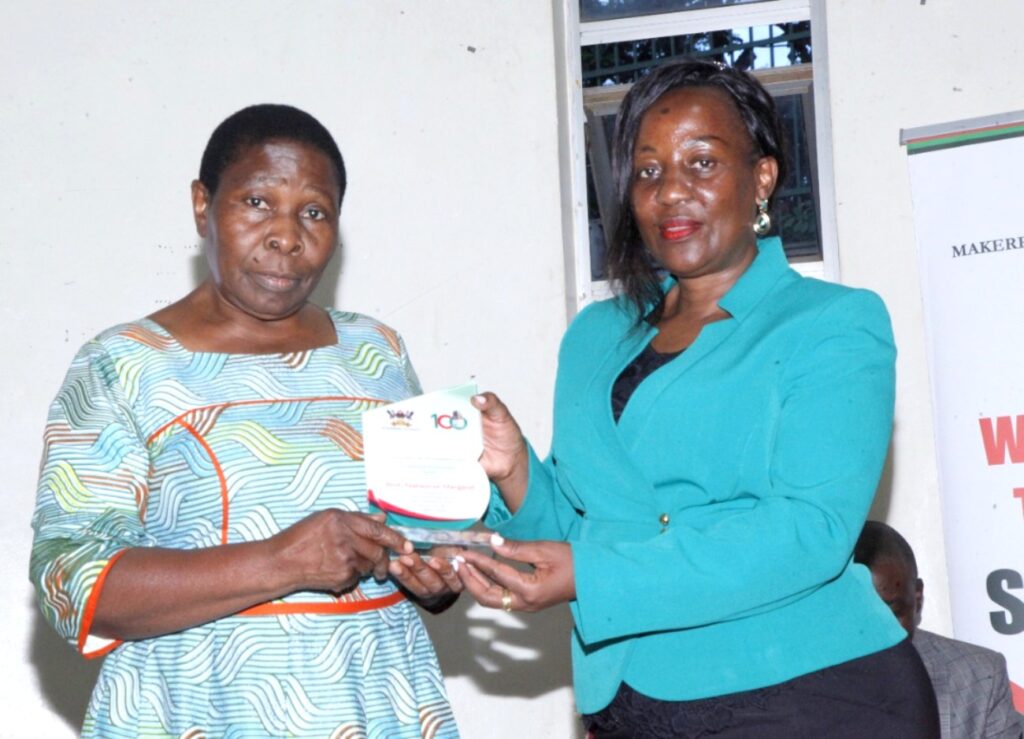
Extra Curricula Activities
- Served on Busitema University Council from 2015-2021 and also Chaired Student Affairs and Disciplinary Committee and Appointments Board.
- Appointed twice by Makerere University as Orator and presented citation for H.E. Yoweri Tibuhaburwa Kaguta Museveni for recognition of his contribution to education, agriculture, fight against HIV/Aids and was awarded D Laws (H.causa) 2019, and for the Distinguished Authorship Award for writing a dictionary-Katondoozi in local language – presented to H.E. in 2020.
- Appointed member of the Board of Trustees of the Uganda Independence Scholarships Trust Fund March 1999 to date. This is a Presidential Appointment.
- Appointed Director on the National Agricultural Advisory Services (NAADS) board by the Minister of Agriculture, Animal Industry and Fisheries, 2002 to 2008.
- Appointed by the Permanent Secretary, Ministry of Education and Sports to serve as Chairman of the Curriculum Subcommittee for the Agricultural Colleges in 2000 that reviewed the curriculum and recommended a two-year Diploma instead of three years.
- Appointed by the Chancellor of Bishop Stuart University, Mbarara as the first Chairman to its Council, June 2003 to date.
- Served as Chairman of the Agribusiness Advisory Committee between the Faculty of Agriculture and the Private Sector in Uganda to monitor a new Masters degree program in Agribusiness Management (1999- 2003).
- Appointed by OSSREA as the National Co-coordinator, Dryland Husbandry Project funded by SIDA. The Faculties of Agriculture and Veterinary Medicine and MAAIF and NARO implemented the project from 1996 –2003.
- Appointed by the Vice-Chancellor, Makerere University to the MU/Government Committee of 14 that prepared a document on Human Capacity building for decentralization supported by the Rockefeller Foundation in 1999/2000. The project attracted about US$17M from the Rockefeller Foundation, World Bank and Government of Uganda. The implementation committee became I@Mak.com – Innovations at Makerere Committee.
- Appointed by Ministry of Education and Sports as member of the Joint Commission for setting up the University of Agriculture and Environmental Sciences 1995-2002. The university has been established and is called Gulu University. He was also chairman of the Curriculum Committee that worked out the academic faculties and programs.
- Appointed member Taskforce for setting up Agricultural University in the North, by the Prime Minister of Uganda, 1994.
- Elected the first President of the newly formed Association of Uganda Professional Agriculturalists (ASUPA) 2002.
- Appointed board member of the Uganda National Examinations Board (UNEB) by the Minister of Education and Sports, 2002 to 2005 and was reappointed on the Board from 2006-2009.
- Member of the Management Committee of the National Agricultural Research Organization (NARO) 1995-2003.
- Member of the National Forum on the Plan for Modernization of Agriculture 1996-2003.
- Member of the National Steering Committee for the Plan for Modernization of Agriculture1996-2003.
- Appointed by Ministry of Agriculture to be Member of the National Steering Committee to Combat Desertification in Uganda, 1997 to 2010.
- National Coordinator, Plant Genetic Resources Coordinating Committee, 1992 -1997.
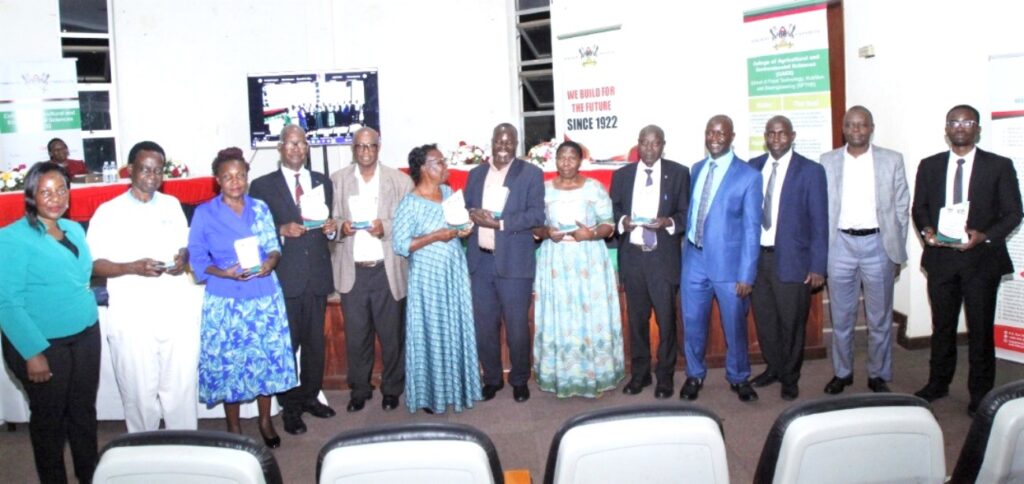
Prof. Sabiiti’s advice to members of staff
- While in service, work for the good of the institution and the good of others and you will be rewarded. “As a Professor at Makerere, I had purpose to build human capital. As a Lecturer, you should always have purpose as to why you are teaching and supervising. I came to Makerere to teach and build others. Learn to sacrifice for the good of others.”
- Mentoring means being able to offer a helping hand to a fallen person or a person struggling with unseen challenges and you do it willingly without expecting rewards from that person. Your expectations from that person is to be a better person.
- Makerere gives you the best environment to grow academically if you want to grow. Learn to love the institution and you will excel in whatever you do.
- To the academic leaders, there is need to balance administration and academics. If you don’t, you will be lost when you leave administration.
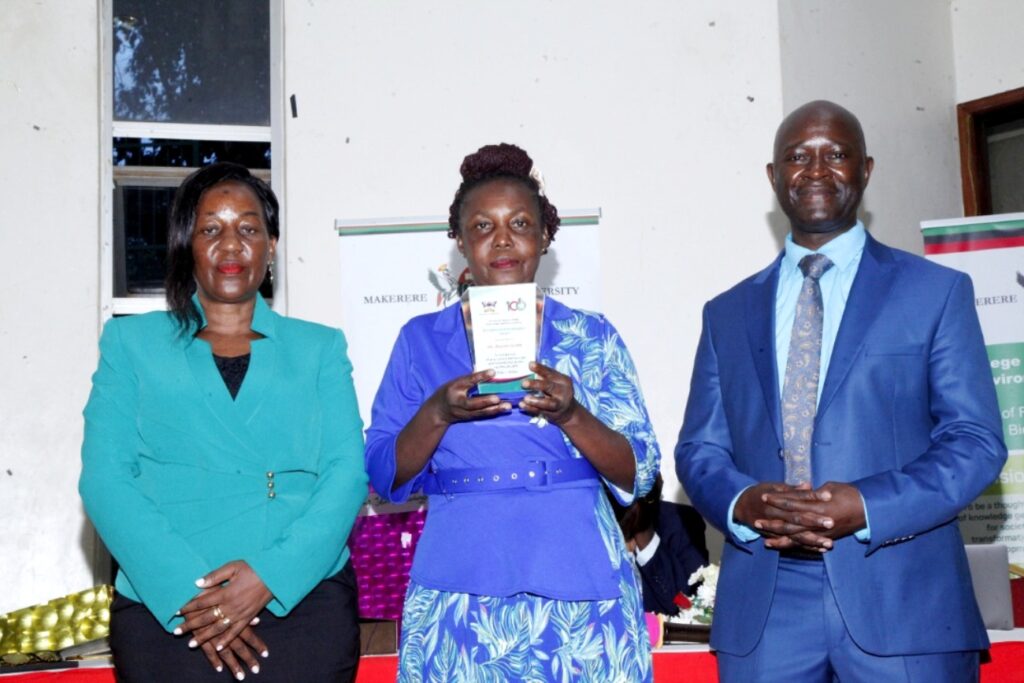
Prof. Sabiiti’s thoughts on the future of CAES
Prof. Sabiiti implored staff to remain united with a common vision for the College. “Focus on growing CAES into a University of Agricultural & Environmental Sciences. Looking back, CAES has had steady developmental phases initially from the Faculty of Agriculture and Forestry to a College status and this has been possible through dedicated service of the various leaders and staff. This practice should be further deepened to turn CAES into a much bigger Institution with more Departments, Schools, Centers, Institutes that fit in the NDPIII and Uganda Vision of 2040. You have a very good Strategic Plan 2020-2030 which should now be regularly revised to focus on what you want to achieve. Use the capacity you have on ground to drive your Strategic Plan. You should all remain united with a common vision championed by your leaders if you want to attain higher levels of development.”
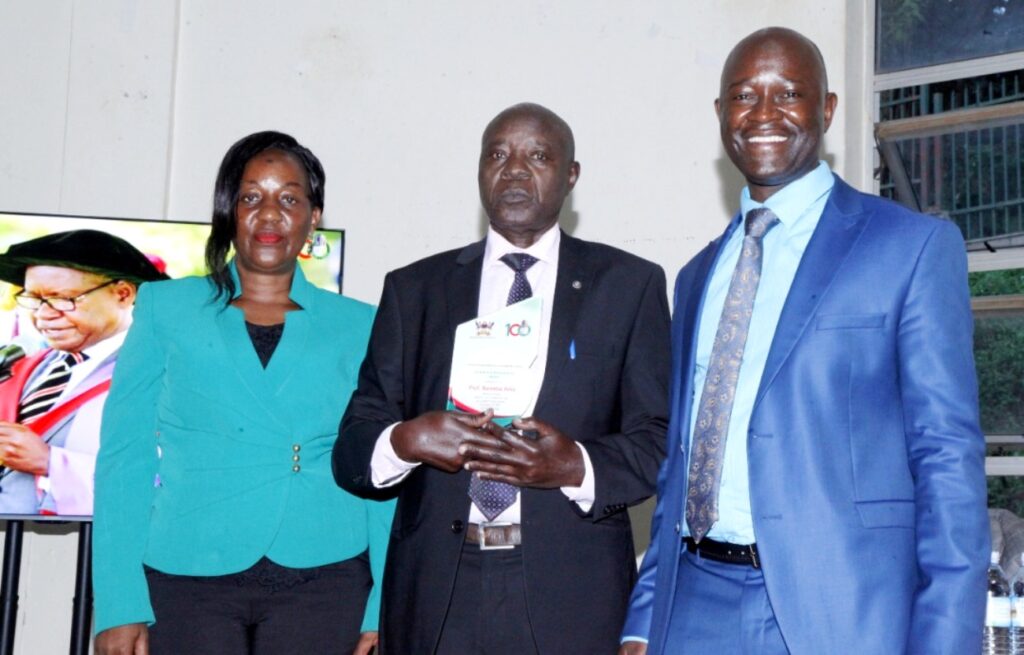
Appreciation
Prof. Sabiiti appreciated the Principal of CAES, Prof. Gorettie Nabanoga for inviting him to deliver his valedictory lecture, and the Deputy Principal, Prof. Yazhidi Bamutaze for coordinating the program.
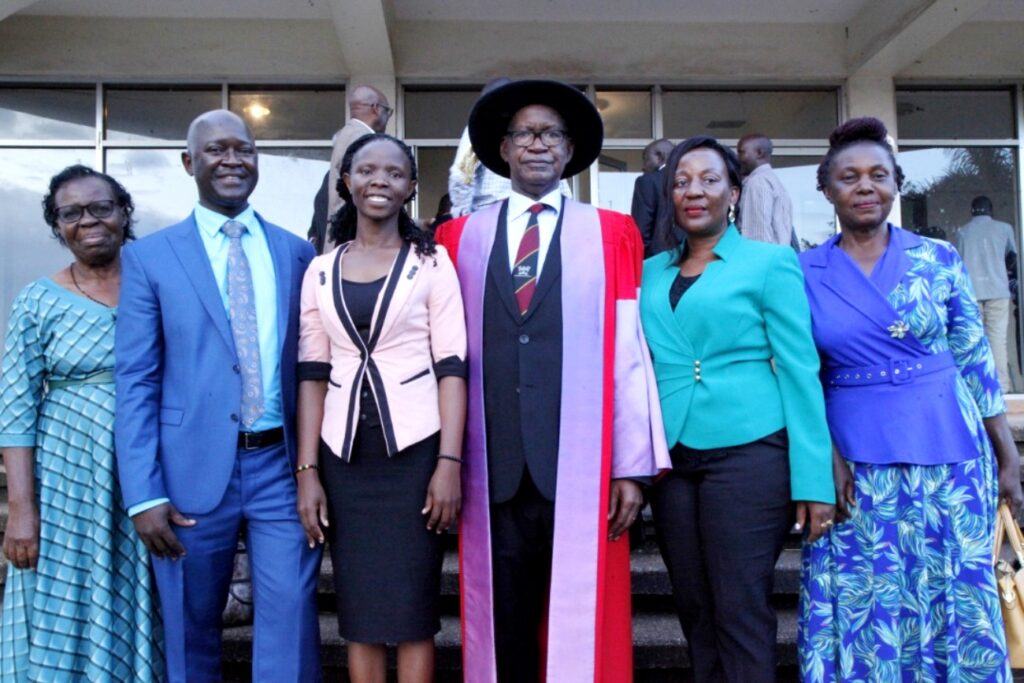
Recognition of retired staff
During the event, the Principal, CAES presented an award to Prof. Sabiiti in recognition of his distinguished service to Makerere University. The Principal, together with the Deputy Principal also presented appreciation awards to other retired members of staff in recognition of their service to Makerere. These included; Prof. Bareeba Felix, Prof. Tenywa Moses, Prof. Hyuha Theodora, Prof. Ssembajjwe Gombya, Prof. William Kyamuhangire, Prof. Nabasirye Margaret, Prof. Mutetikka David, Prof. Tenywa John Stephen, Dr Matsiko Francis, Dr Okiror John James, Dr Nagadya Harriet, Dr Christine Magala Nyago, Dr Michael Iwadra, Ms. Nanziri Sarah, Ms. Kawooya Teddy Mary, Mr. Eugene Manda, Mr. Tibakuzira Arnest, Mr. Emmanuel Nabyama, Ms. Toepista Namayanja, Everst Emuron, and Ms. Benny Kaitesi.
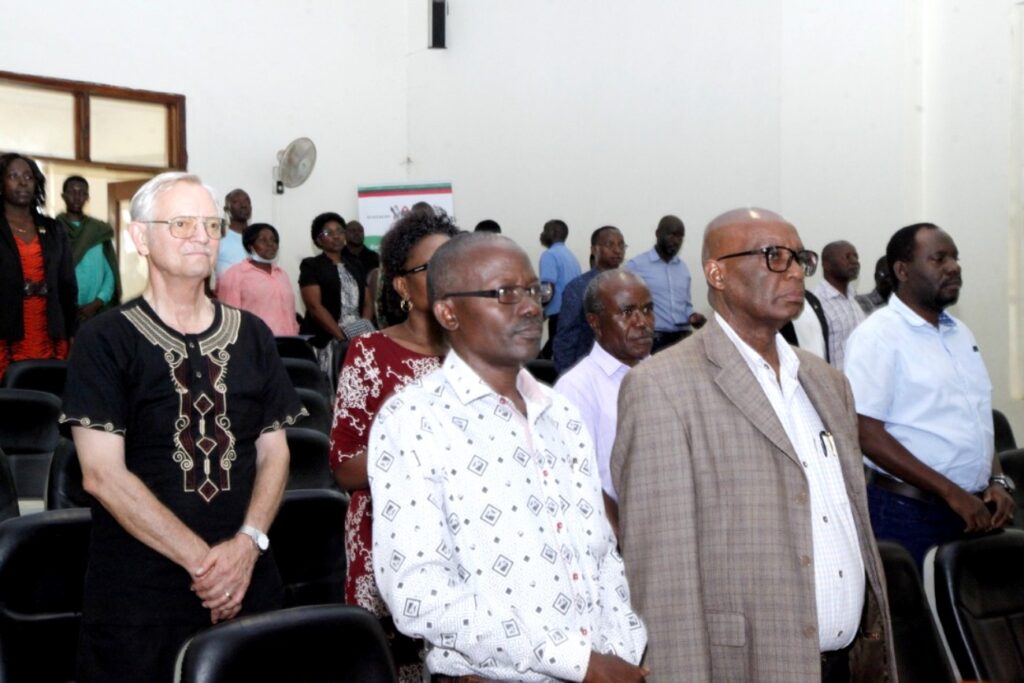
The Principal appreciated Prof. Elly Sabiiti and the other retirees for serving Makerere with utmost diligence. “It’s because of their sacrifices that CAES has grown and excelled in many aspects,” she noted.
The Valedictory Lecture was moderated by Dr Patrick Byakagaba, a member of staff at CAES.
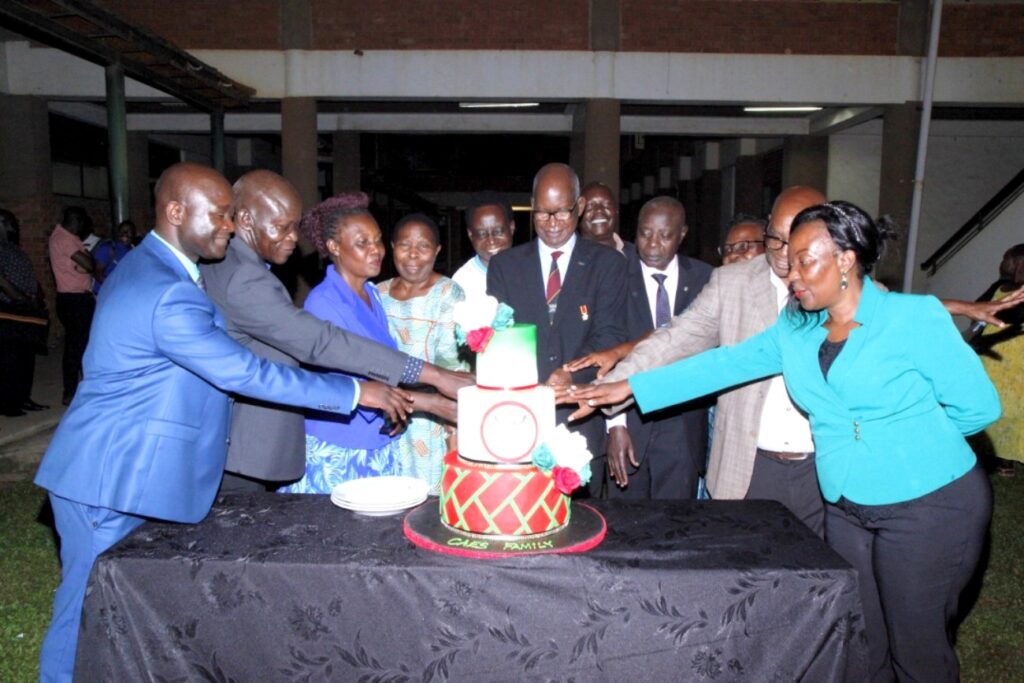
Full presentation attached below.
You may like
-
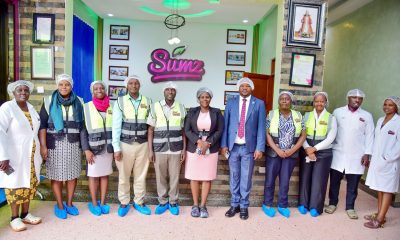

Makerere Explores Strategic Industry Partnership with Psalms Food Industries to Strengthen Manufacturing Innovation
-
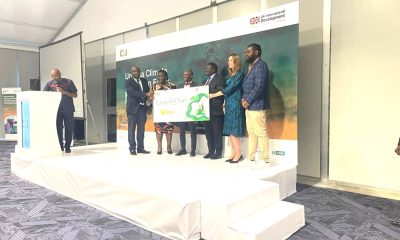

Makerere University Researchers Awarded UCIF Grant to Tackle Maize Contamination with Innovative Plant-Based Fungicide
-


Makerere University commemorates 13 transformative years of partnership with Mastercard Foundation
-


Mak News Magazine: February 2026
-
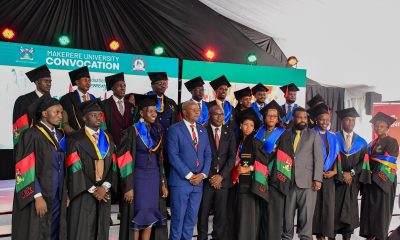

76th Graduation Ceremony: CoBAMS Staff and Graduates Win Excellence Awards
-


Celebrating Academic Excellence: CoBAMS Presents 975 Graduands at Mak 76th Graduation Ceremony
Agriculture & Environment
CAES Presents Overall Best Performing Student in the Sciences & a Record 28 PhDs at the 76th Graduation Ceremony
Published
1 week agoon
February 25, 2026
The College of Agricultural and Environmental Sciences (CAES) presented the best performing student in the Sciences at the 76th Graduation Ceremony of Makerere University. Ms. Esther Ziribaggwa graduated with a CGPA of 4.77 in the Bachelor of Agricultural and Rural Innovation. She credits her success to resilience and hard work, despite the financial challenges she faced during her studies.
The four-day 76th graduation ceremony commenced on 24th February 2026 with the CAES, the College of Computing and Information Sciences (CoCIS), the College of Education and External Studies (CEES), and the School of Law presenting graduands for the award of degrees and diplomas of Makerere University.

CAES Graduation Statistics
CAES presented a total of 561 students (238 female and 323 male). Of these 28 (10 female and 18 male) graduated with PhD, 144 (68 female and 76 male) with Masters, 380 (157 female and 223 male) with Bachelor’s degrees, and 9 with Post graduate diplomas (3 female and 6 male). The PhD graduates included; Mr. Ainebyona Ronald Rwambuka, Ms. Amongi Winnyfred, Ms. Apil Jenifer, Mr. Asizua Denis, Mr. Astatke Dejene Kebede, Ms. Atuhairwe Privah, Ms. Ayesiga Stella Bigirwa, Mr. Biryomumaisho Dickson, Ms. Cherotich Harriet, Mr. Kalimunjaye Samuel, Ms. Kesiime Vasiter Eunice, Ms. Khakasa Elizabeth, Mr. Kimbowa George, Mr. Komi Gentle Wilson, Mr. Kusiima Kaheesi Samuel, Mr. Mathe Lukanda Musondolya, Mr. Mukama Innocent Hope Tinka, Mr. Mukengere Bagula Espoir, Mr. Nakhokho Evans Martin, Ms. Faridah Nalwanga Sendagire, Ms. Nalweyiso Amina, Ms. Nampijja Zainah, Ms. Njenga Peninah Wambui, Mr. Nkurunziza Gelase, Ms. Ojera Alal Ato Gertrude Miriam, Mr. Sebuliba Richard Mutumba, Mr. Shimali Fred, and Mr. Ssubi Allan Johnson.

Overall graduation Statistics
During the course of the 76th graduation ceremony, a total of 9,295 students will graduate with degrees and diplomas of Makerere University. Of these, 4,262 (46%) are female and 5,033 (54%) are male. A total of 213 students will graduate with PhDs, the highest number in the history of the University; 2,503 with Masters degrees; 6,343 with Bachelor’s degrees; 206 with postgraduate diplomas, and 30 with Diplomas.
Postgraduates constituted 31.4% of the total number of graduands.
Remarks by the Vice Chancellor
Addressing the congregation, the Vice Chancellor of Makerere University, Prof. Barnabas Nawangwe, congratulated the graduates on reaching this significant milestone. “You graduate today from one of the finest universities in the world,” he said. “You have distinguished yourselves through discipline, integrity, and academic excellence, and we are immensely proud of you. The qualifications you carry are vital to society. We have equipped you with the knowledge and skills to secure employment or to create enterprises that will, in turn, employ others. Should you not find immediate employment, do not despair, instead, reflect on the vast opportunities around you and rise to the challenge as entrepreneurs. Do not despise humble beginnings. To our PhD graduands, you now join the global community of scholars. Africa looks to you with great expectation. Use your expertise to transform our continent.”

He appreciated the parents and guardians for the sacrifices they made to support their children’s education.
New Research Excellence Recognition Plans
The Vice Chancellor informed the congregation that beginning with the 76th graduation ceremony, the University will recognize outstanding PhD students who are members of staff. He congratulated those who completed their doctoral studies in record time while continuing to serve without study leave, commending their resilience and leadership. “These will receive the Makerere PhD Resilience Award”.
Similarly, the University will henceforth honour the best PhD and Master’s theses, as selected by the Higher Degrees Committee of Senate. The students with the top 10 theses at the 76th graduation are: Kawesi Paul – MA Law (School of Law), Katende Stephen – MSc Quantitative Economics (COBAMS), Najjinda Shamirah – PhD Management (COBAMS), Turyahabwe Irene – MSc Molecular Biology (COVAB), Tayebwa Dickson – PhD (COVAB), Batte Herbert – PhD Mathematics (CONAS), Ssekago Arnold – MSc Mathematics (CONAS), Namiyingo Julian – PhD Literature (CHUSS), Namata Brenda – MSCO (CHUSS), and Tayebwa Asaph Kamau – MBA (MUBS).

Recognition of the CAES Research Output
In his remarks, the Vice Chancellor commended the College of Agricultural and Environmental Sciences for spearheading transformative research aimed at strengthening Africa’s food systems. Among the initiatives he highlighted was the Healthy Soy Project, funded by the Danish Ministry of Foreign Affairs, which seeks to develop sustainable, affordable, and nutritious soy-based foods to combat child stunting in Uganda and other climate-affected regions. He also cited a project focused on enhancing value addition in cocoa production through the development and scaling of a single fermentation box technology, now adopted by more than 70% of farmers in major cocoa-producing districts.

Efforts to Transform Makerere into a Research-led University
The Vice Chancellor noted that Makerere University continues to advance steadily toward becoming a truly research-led institution – one that generates knowledge to empower communities, strengthen industries, and drive national transformation.
He expressed gratitude to the Government of Uganda for entrusting the University with resources to support more than 1,400 high-impact research and innovation projects under the Makerere University Research and Innovations Fund (Mak-RIF). The Fund has enabled researchers to provide practical, evidence-based solutions in sectors including agriculture, land management, energy and minerals, peace and security, and education. Through Mak-RIF, over 200 PhD students have received support to pursue their research, many of whom are graduating at the 76th graduation ceremony.

The Vice Chancellor further highlighted the pivotal role of the Makerere University Technology and Innovations Centre (MUTIC) in advancing incubation and commercialization. “The Centre offers mentorship, business development training, intellectual property support, and industry linkages to help transform research outputs into viable enterprises. To date, eleven spin-off companies have been established by students and staff, while the University’s Innovation Pod (UniPod) has incubated more than 100 projects in the past year. The short-term target is to establish 50 spin-off companies annually, with plans to double that number in the long term.”
In partnership with the Science, Technology and Innovation Secretariat in the Office of the President, the University has also introduced awards to recognize outstanding researchers and innovators. “The Innovation Commercialization Award underscores the institution’s commitment to translating research into practical products, services, and technologies that address real-world challenges and support national development,” the Vice Chancellor noted.

Prof. Nawangwe appreciated the Government of Uganda for securing a USD 162 million loan from the Korea Exim Bank to support critical infrastructure development at the University. The funding will facilitate the construction of new facilities for the School of Medicine, School of Dentistry, School of Engineering, the Science and Technology Centre, and the completion of the School of Computing and Information Sciences- an unprecedented development in the University’s history.
He also thanked development partners who provide research grants and scholarships, including the MasterCard Foundation, European Union, Norwegian Agency for Development Cooperation, Swedish International Development Cooperation Agency, International Development Research Centre, Korea International Cooperation Agency, German Academic Exchange Service, National Institutes of Health, Centers for Disease Control and Prevention, United States Agency for International Development, Wellcome Trust, KfW, Inter-University Council for East Africa, Regional Universities Forum for Capacity Building in Agriculture, African Research Universities Alliance, the PLUS Alliance, the Worldwide Universities Network, the Association of African Universities, the Alliance for African Partnership, the Madhvani Foundation, and the Government of Uganda through the Higher Education Students Financing Board.

He further acknowledged the Embassy of China, the Chinese Chamber of Commerce, various government ministries, State House, and private sector partners – including Stanbic, Absa, NCBA, DFCU, and Centenary Bank-for their continued support.
Remarks by the Chancellor
In his remarks, the Chancellor, Hon. Dr. Crispus Kiyonga, appreciated the parents, guardians, and sponsors whose unwavering support enabled the students to succeed.
“At the heart of the graduands’ accomplishments are the professors, lecturers, and administrators of the University, ably supported by the University Council. It is only fitting that we acknowledge and commend them for a job well done,” he noted.

He further extended profound gratitude to H.E. Yoweri Kaguta Museveni and the NRM Government for the invaluable financial and other support extended to the University.
Going forward, he encouraged the University Administration to strengthen research funding, forge stronger partnerships with the private sector to commercialize innovations, deepen structured engagement with communities, and fully leverage the abundant technological resources available to the institution.
Message from the Minister of Education and Sports
The Minister of Education and Sports, also First Lady, Hon. Janet Kataaha Museveni, represented by Hon. Dr. Joyce Moriku Kaducu – Minister of State for Primary Education, commended the Vice Chancellor and the leadership of Makerere University for upholding the standards that continue to distinguish the University across Africa and beyond.

She expressed gratitude for the spirit of constructive collaboration among management, staff, students, and development partners, noting that such cooperation is vital for institutional growth and academic excellence. She paid special tribute to the University Council, particularly the Chairperson and its members, for their dedicated oversight and stewardship. Their commitment to transparency and good governance, she observed, has strengthened public confidence in this historic institution.
A major milestone highlighted by the Minister was the establishment of the Makerere University Research and Innovation Fund (RIF), which supports high-impact research aligned with national priorities and development goals. Through this initiative, thousands of researchers and innovators have developed practical, scalable solutions that are transforming communities and key sectors across Uganda.

She reaffirmed the Ministry’s commitment to strengthening higher education through expanded research funding, digital transformation, cultural reform, and stronger collaboration between academia and industry. “The vision is clear: universities must not only produce graduates, but also solution-makers and job creators”.
Implementing the Competence-based Education and Training
Reiterating a key directive from the Ministry of Education and Sports, she emphasized that all institutions of higher learning must prepare for the full implementation of Competence-Based Education and Training by July 2027. “This reform represents more than a policy shift. It signals a fundamental transformation in how graduates are prepared, with greater emphasis on practical skills, innovation, and problem-solving.”

She urged the Vice Chancellor and his team to lead in curriculum reform, staff development, and infrastructure enhancement to ensure the successful rollout of competence-based education.
The Minister further urged university management to ensure that all satellite campuses are fully accredited and that their programmes meet the same high standards of quality and relevance as those offered at the main campus. This, she stressed, is essential to safeguarding the integrity of the University’s degrees and effectively serving students nationwide.

Addressing the graduates, she noted that Uganda and Africa need innovators to modernize agriculture, engineers to build quality infrastructure, healthcare professionals to strengthen health systems, and educators to inspire future generations. “The world you are entering is dynamic, interconnected, and technologically driven. Artificial Intelligence is reshaping industries; climate change is redefining agriculture and urban planning; and global markets are transforming employment patterns. In this rapidly evolving landscape, you must remain adaptable, creative, and committed to lifelong learning.”
Address by the Commencement Speaker, Prof. Nicholas Ozor
In his address titled Knowledge with Purpose and Service with Integrity, the Commencement Speaker, Prof. Nicholas Ozor, Executive Director of the African Technology Policy Studies Network, urged the graduates to embrace lifelong learning, prioritize purpose over comfort, build character before career, and serve something greater than themselves. He encouraged them to believe in Africa and take action, rather than waiting for solutions from elsewhere.

Addressing the graduates of CAES, he emphasized that they stand at the intersection of survival and sustainability. “In a world confronting climate change, food insecurity, and environmental degradation, your knowledge is vital. You will work with farmers, ecosystems, land, water, and policy. You will shape food systems and livelihoods. Respect indigenous knowledge, embrace scientific innovation, and champion sustainability. The future of Africa depends on how well we feed our people and protect our land.”

Research Excellence and Innovation Commercialization Awards
During the graduation ceremony, Makerere University recognized the top researchers and innovators from the 10 Colleges. At CAES, Dr Mugabi Robert from the School of Food Technology and Nutrition received the Overall Top Researchers Award, 2026; Dr. Nalwanga Sendagire Faridah received the Best Early Career Researcher Award, Dr Mugabi Robert scooped the Mid-Career Research Award whereas Prof. Yazidhi Bamutaze got the Senior Career Research Award. Prof. Phinehas Tukamuhabwa, Dr Ephrahim Nuwamanya, Assoc. Prof. Ahamada Zziwa, and Dr Ssempijja John Edson were recognized among the best innovators.

More about Esther Ziribaggwa, the overall best performing student in the sciences:
Agriculture & Environment
Mak hosts First African Symposium on Natural Capital Accounting and Climate-Sensitive Macroeconomic Modelling
Published
2 weeks agoon
February 20, 2026
African economies are increasingly exposed to climate-related shocks that threaten development gains, fiscal sustainability, and macroeconomic stability. From extreme weather events and biodiversity loss to the depletion of natural capital, climate risks are reshaping economic realities across the continent. Yet many macroeconomic frameworks used in public finance and planning continue to overlook climate and nature-related risks and the long-term benefits of resilience and adaptation investments.
To address this emerging reality, over 250 participants from Africa, Europe and beyond, convened at Makerere University – Kampala, on the 12th and 13th of February 2026, to participate in the First African Symposium on Natural Capital Accounting and Climate-Sensitive Macroeconomic Modelling.
Following the theme, “Climate-Sensitive Macroeconomics: Rethinking Growth in Africa’s Natural Resource Base, the hybrid symposium organized by Makerere University through the Centre of Excellence for Africa Climate-Sensitive Macroeconomic Modelling (CEACM) within the School of Economics, under the College of Business and Management Sciences (CoBAMS), the Environment for Development Initiative (EfD), and the Ministry of Finance, Planning and Economic Development (MoFPED) in Uganda, brought onboard ministers, leading economists and planners, researchers, policy makers, the academia, development partners, climate change experts and the media.
The Symposium being the first of its kind on the continent, reflected Africa’s growing determination to work collectively in confronting shared development challenges, building on recent momentum such as the formation of Pan-African Finance Ministers Forum for Climate Action (PAFMCA).
Featuring speeches and presentations from notable speakers and partners, a keynote address on Natura Capital Accounting and Climate Change Nexus in Africa and their impact on Fiscal Policy, panel discussions, expert opinions, and exhibition kiosks (World Café), the symposium presented a platform to strengthen Africa’s analytical and institutional capacity to integrate climate and natural capital considerations into macroeconomic and fiscal policy.
Vice Chancellor underscores the role of universities
Welcoming the delegates to Makerere University, the Vice Chancellor-Prof. Barnabas Nawangwe emphasized that universities must lead innovation and collaborative research efforts to support collective climate change mitigation across the continent.
In the same vein, he advocated for strong collaboration between universities in Africa and government Ministries. “Makerere’s collaboration with the Ministry of Finance, Planning and Economic Development, stands as a shining example of how academia and government can strengthen economic management,” he said.

Prof. Nawangwe revealed that the collaboration between Makerere University and the Ministry, has strengthened macroeconomic modelling, fiscal policy analysis, and technical capacity within government. In addition, the partnership led to the establishment of the Centre of Excellence for Africa Climate-Sensitive Macroeconomic Modelling, bridging academic scholarship with real-world policy application.
“We have jointly established the Centre of Excellence for Africa Climate-Sensitive Macroeconomic Modelling. The Centre (established in August 2025) is anchored within the School of Economics in the Department of Policy and Development Economics, under the Master of Science in Economic Policy and Investment Modelling, a program jointly facilitated by Makerere University, the Ministry of Finance, Planning and Economic Development and the Bank of Uganda,” he mentioned.
Climate and Economic transformation are inseparable
The Vice Chancellor highlighted the critical intersection between economic transformation and environmental sustainability, noting that economies in Africa, heavily dependent on natural resources, face unprecedented pressures from climate shocks, biodiversity loss, and environmental degradation. Convinced that economic growth cannot be pursued in isolation from climate and environmental realities, he stressed the importance of integrating natural capital accounting and climate considerations into national development strategies.
Prof. Nawangwe advocated for shared responsibility of universities, research institutions, and policymakers to develop innovative analytical tools, responsive policy frameworks, and strong institutional capacities that promote sustainable growth while safeguarding environmental assets for future generations.
The Vice Chancellor commended UN PAGE and the Global Green Growth Institute (GGGI) for funding the symposium, as well as, other stakeholders namely the European Union and the Coalition of Finance Ministers for Climate Action (CoFMCA), Ministry of Water and Environment (MoWE), National Planning Authority (NPA), Uganda Bureau of Statistics (UBOS), the National Environment Management Authority (NEMA) for being reliable partners.
Integrating Climate into Fiscal Policy
During the opening ceremony, the Minister of Finance, Planning and Economic Development, Hon. Matia Kasaija underscored the urgency of embedding climate considerations into economic planning.
“As Ministers of Finance, we are often confronted with difficult trade-offs. Our task is to balance the needs of today with sustainability for future generations,” said Hon. Kasaija, in a speech read by Hon. Henry Musasizi, the Minister of State for Finance (General Duties).

The Minister guided that traditional macroeconomic models focusing only on growth, inflation, and fiscal balance are inadequate in an era of climate shocks. He affirmed that African economies are facing interconnected challenges which directly impact economic growth. He stressed that traditional macroeconomic frameworks must evolve to systematically incorporate environmental degradation and climate shocks, whose consequences can no longer be ignored in policy analysis.
“For countries such as Uganda, whose development prospects are closely linked to natural resources and the climate-sensitive sectors, these challenges are not abstract. They affect livelihoods, public finances and long-term economic resilience,” he mentioned.
The Minister emphasized that natural capital accounting and climate-sensitive macroeconomic modelling are vital for valuing natural assets, assessing environmental costs, and guiding sound investment decisions.
Protecting Africa’s Natural Capital
Hon. Beatrice Atim Anywar, Minister of State for Environment, emphasized the urgent need to protect Africa’s ecosystems. “Africa stands at a defining crossroads. Our economies remain anchored in natural capital—forests, water resources, biodiversity, land, and ecosystems—which sustain life, generate fiscal revenue, and underpin development,” she said.
She warned that climate-related shocks are already undermining growth and public investment. “Floods, droughts, land degradation, biodiversity loss, and water stress are no longer distant risks. They are present realities, already affecting productivity and macroeconomic stability,” she said.
She emphasized the need for improved economic models that account for environmental and climate risks: “Traditional macroeconomic frameworks have not adequately captured climate risks or the long-term economic benefits of resilience and adaptation. This limits our ability to make informed policy decisions as Africa pursues economic transformation, energy security, and fiscal stability,” she stated.
Hon. Anywar highlighted collaboration with GIZ, Makerere University, and government ministries, which led to the development of the MONCAP (Model for Natural Capital Policy Assessment). “This tool is being used to assess natural capital assets for climate change, energy transition, and their linkages to the macroeconomy. It supports budgeting by estimating the cost of depleted natural capital assets,” she said.
“Water security, forest conservation, ecosystem restoration, and climate adaptation are not costs. They are investments in Uganda’s long-term economic stability, productivity, and prosperity.”
Stakeholders urged to transform climate threats into opportunities
Adam Sparre Spliid, the Deputy Head of Mission, Danish Embassy said: “Integrating climate risk and natural capital into our macroeconomics frameworks is not only academic exercise, it is a massive de-risking strategy for private investment. By bridging the gap between government policy and planning, academia and research, and the private markets, we transform climate threats into tangible opportunities.”
Sustainability includes youth, jobs and human well-being
Dr. Steven Stone, Chair of the UN PAGE Management Board, emphasized that sustainability extends beyond the environment to encompass youth, jobs, economic growth, and human well-being. “While the environment is Africa’s foundational source of wealth, sustainable development requires balancing ecological stewardship with economic progress, including income and employment for the youth which are critical priorities for countries such as Uganda.”
Dr. Stone highlighted that UN PAGE, originating from the Rio+20 Conference, supports climate-sensitive economic policy in Africa, emphasizing that dialogue, scenario-building, cross-sector collaboration, and strong partnerships are key to advancing sustainable, inclusive, and climate-resilient development.
Africa’s Wealth Declining
In the keynote address titled, Natural Capital Accounting and Climate Change Nexus in Africa and their Impact on Fiscal Policy, Paul Jonathan Martin, Manager of Environmental Operations at the World Bank for Eastern and Southern Africa, and a specialist with over 30 years in climate and natural resources, warned that Africa’s overall wealth is under threat due to declining renewable natural capital.
“Produced capital has increased by 20%, human capital by a third, but renewable capital has declined by 30%,” Martin said. “When combined, Africa’s overall wealth trajectory has been weakening since 2010.”
He stressed that natural resources must be treated as economic assets requiring systematic accounting: “Africa’s rich natural resources are fundamental for sustainable development,” he said.
Citing examples from Ethiopia and Kenya, he highlighted successful integration of natural capital into public investment and budget decisions. “In Ethiopia, there are payments for ecosystems and investment prioritization tools. In Kenya, natural capital accounting integration into budgets has strengthened public investments. Climate change has deep, cascading effects across sectors, but Africa has major potential to lead climate solutions,” he said.

Martin also highlighted the economic benefits of climate adaptation: “From 2020–2050, the cumulative effect of adaptation on Uganda’s GDP is positive. Without action, under a dry/hot climate future, GDP could significantly deviate from projected growth paths.”
Drawing on insights from over 70 country climate and development reports produced by the World Bank, the keynote speaker highlighted the profound macroeconomic impacts of climate change across Africa. He stressed the importance of integrating climate and natural capital into macroeconomic planning. He noted that Africa’s forests, water systems, and biodiversity are vital for sustainable development but face growing threats from climate change, environmental degradation, and climate-related disasters that undermine productivity, public investment, and economic stability.
He observed that traditional macroeconomic models often fail to capture the value of natural assets and regulating ecosystem services, which are critical to both economic stability and resilience but are largely excluded from GDP calculations.
Africa-Led Solutions
Prof. Edward Bbaale, Principal, College of Business and Management Sciences (CoBAMS), stressed the importance of developing African-led solutions. “We need to champion the Africa-led model. We need approaches that fit our unique context. Africa is not here to take in other frameworks blindly,” he said.
By supporting research, training, policy dialogue and modelling innovation, the Centre of Excellence for Africa Climate Sensitive Macroeconomic Modelling (CEACM) positions Makerere University as a regional hub for advancing climate-sensitive macroeconomic policy across Africa.
He highlighted CEACM’s capacity-building programs: “Our goal is to ensure African Ministries of Finance have home-grown expertise to integrate climate and natural capital considerations into fiscal and macroeconomic policy. This is critical for long-term resilience and sustainable development,” he said.
The Principal explained that establishment of independent research centres enables Makerere University to go beyond traditional academic instruction and focus deeply on societal challenges, particularly those related to climate change, environmental degradation, and biodiversity loss.

He reported that the Centre of Excellence for Africa Climate-Sensitive Macroeconomic Modelling is structured to advance methodological innovation, develop new data systems, and strengthen climate-sensitive macroeconomic tools that are tailored to the African context.
MONCAP Model for Policy Assessment
Dr. Peter Babyenda, a member of faculty at CoBAMS, demonstrated MONCAP (Model for Natural Capital Policy Assessment), which integrates climate and natural capital variables into fiscal and macroeconomic planning.
“MONCAP allows policymakers to estimate the economic cost of depleting natural assets such as forests, wetlands, and water resources. It helps simulate policy options and determine how investments in natural capital yield long-term benefits,” Babyenda said. “We came up with this model to aid the Ministry of Water and Environment. This model is open—you can extend it,” he added.

He highlighted capacity-building initiatives, including short courses and the Master of Science in Macroeconomic and Investment Modelling, designed to train economists to incorporate natural capital and climate into policy planning.
International Perspectives
Sweetman Liam, Ireland’s Finance Minister, highlighted the economic value of ecosystems: “There is a deeper value of landscapes in flood prevention and biodiversity. Decision-making was informed, and people started understanding economic value,” he said.
Prof. Chukwuone Nnaemeka of the University of Nigeria emphasized collaboration with national statistical agencies: “We coordinate with the National Bureau of Statistics to develop natural capital accounting metrics. Increase the use of Natural Capital Accounting in decision-making,” he stated.
Technical and Parallel Sessions
The afternoon session featured three parallel sessions focusing on Natural Capital Accounting Methodologies and Best Practices, Climate-Sensitive Fiscal and Economic Modelling, and Natural Capital Accounting and Model Uptake and Use.
Drawing on diverse expertise, the panels highlighted innovative approaches and demonstrated that natural capital is not an environmental afterthought, but a central pillar of sustainable economic and policy planning.
The first day of the African Symposium drew to a close with interactive exhibitions at the World Café, where case studies and practical demonstrations highlighted innovative approaches to integrating climate and natural capital into economic planning. Participants actively engaged in discussions and networking, forging collaborations that promise to advance climate-sensitive fiscal and development strategies across Africa, setting a strong and optimistic tone for the days ahead.
Agriculture & Environment
Uganda Martyrs Namugongo Students Turn Organic Waste into Soap in an Innovative School Project on Sustainable Waste Management
Published
2 weeks agoon
February 20, 2026
*****The students were supervised by researchers from the College of Agricultural and Environmental Sciences (CAES) at Makerere University, led by Prof. Fred Kabi.
The garbage challenge
With urbanization rates rising rapidly across Uganda, municipal solid garbage generation in the country’s cities is projected to increase by more than 40 percent by 2050. The growing burden of unmanaged garbage, particularly organic garbage, continues to pose environmental and public health risks, underscoring the urgent need for innovative and sustainable solutions.
It is against this backdrop that Senior Four students of Uganda Martyrs Secondary School Namugongo undertook a project to demonstrate how local market garbage challenges can be transformed into opportunities for sustainable development.

Addressing the garbage Challenge
As part of their academic project under the competence-based curriculum, the students were tasked with identifying real-world challenges within their communities and developing practical solutions using locally available resources. Through research and field observations, they identified poor garbage management, particularly the accumulation of organic waste at major dumping sites such as Kiteezi Landfill, as a critical issue.
At these sites, unsorted solid garbage often accumulates uncontrollably, sometimes leading to collapses that pose serious environmental and public health risks including water contamination by leachates, persistent foul odors, and disease outbreaks.

Rather than solely viewing solid market garbage as a problem, the students recognized its untapped potential within the biodegradable fraction of market garbage streams. Their innovative solution was to convert organic solid market waste (biodegradable garbage) into an industrial raw material for soap production by utilizing saprophagous Black Soldier Fly larvae (BSFL) to accumulate lipids and applying the scientific process of saponification.
Makerere University Support to the project
The students’ project was supervised by Prof. Fred Kabi together with technicians from the College of Agricultural and Environmental Sciences (CAES) at Makerere University. Prof. Kabi and his team have been actively researching on Black Soldier Fly Larvae (BSFL) as a bio-waste management technology capable of converting biodegradable solid municipal garbage and farm waste into valuable by-products such as organic fertilizers, animal feeds, soap, and biodiesel.
Working in collaboration with Ento Organic Farm Uganda Ltd, the researchers have demonstrated how insect-based waste conversion systems can support a circular economy by transforming biodegradable waste into industrial raw materials.

According to Prof. Kabi, the five young garbage entrepreneurs (students) began their project by collecting information on household garbage management practices. After analyzing the data, they engaged stakeholders along the garbage value chain to brainstorm all-inclusive, source-based waste management strategies.
“The students developed a solution that links efficient waste management at garbage generation source to support production of organic fertilizer, insect protein for animal feeds, and soap, which is only possible with biodegradable garbage,” Prof. Kabi explained. “This approach of the Competence Based Curriculum (CBC) for lower secondary schools supports the concept of taking Makerere University to the community of budding scientists while promoting sustainable community development through a circular economy.”
From Market Waste to Soap Bars
The Team leader, Ms. Ivy Stephanie Kitali explained the step-by-step scientific process behind the project. The students began by collecting organic waste from local markets, which was then shredded to prepare it for the larvae as a substrate. “Black Soldier Fly larvae were then introduced to the prepared waste. The larvae efficiently consumed the organic matter, greatly reducing its volume while accumulating lipids (fats) in their bodies. After maturation, we separated the larvae from the remaining waste, euthanized through blanching and dried it. Oil was then extracted from the dried larvae using ethanol as a solvent. This lipid-rich oil became the primary ingredient or raw material for soap production. To enhance the final product, the larvae oil was blended with minute quantity of sunflower oil before adding sodium hydroxide, initiating saponification, the chemical reaction that transforms fats and oils into soap,” she explained. The process ultimately yielded usable bars of soap derived entirely from what had once been discarded as unwanted market waste/garbage.

Building Skills and Sustainable Innovation
Beyond producing soap, the project provided students with hands-on training in scientific research, waste management techniques, bio-chemistry, and sustainable innovation. They gained practical exposure to insect-based biotechnology and learned how environmental challenges can be addressed through science-driven by entrepreneurship.
Trending
-

 General12 hours ago
General12 hours agoCall for Applications: Diploma Holders under Government Sponsorship 2026/2027
-

 General12 hours ago
General12 hours agoAdvert: Admissions for Diploma/Degree Holders under Private Sponsorship 2026/27
-

 Humanities & Social Sciences1 week ago
Humanities & Social Sciences1 week agoMeet Najjuka Whitney, The Girl Who Missed Law and Found Her Voice
-

 General1 week ago
General1 week ago76th Graduation Highlights
-

 Agriculture & Environment2 weeks ago
Agriculture & Environment2 weeks agoUganda Martyrs Namugongo Students Turn Organic Waste into Soap in an Innovative School Project on Sustainable Waste Management
